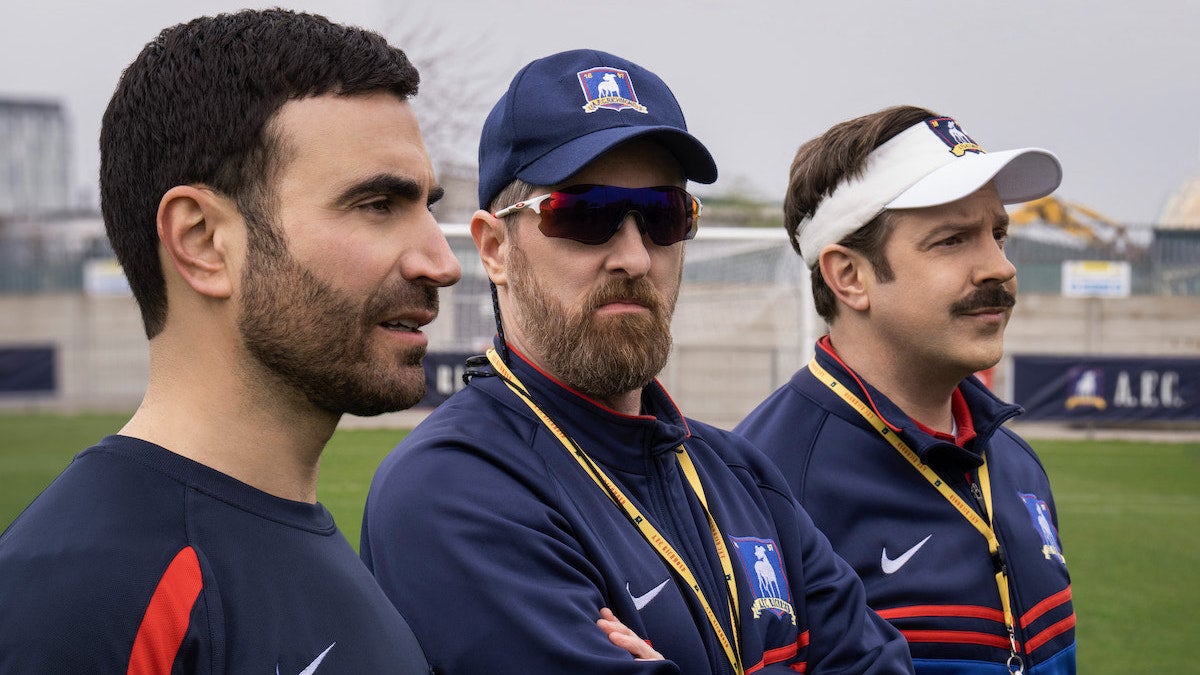
Remember when “Ted Lasso” was a sitcom? The show might have included plenty of unexpected pathos and the faster cuts of a single-camera production, but its first season still set up an accessible fish-out-of-water comedy about an optimistic American football coach (Jason Sudeikis), heading to England during a time of personal crisis, to try his hand at soccer. It felt like Apple TV+ took the core of a network-TV project and, using strong characterization and well-chosen swear words, polished it into a streaming gem.
In its third and possibly final season, there are still aspects of “Lasso” that recall network
television — though not always comedy. The first four episodes of its 12-episode season all run around 50 minutes, closer to the length of a brisk network drama than even a supersized-by-streaming sitcom. And now that Ted has become more acclimated to his job and temporary home, the show’s framework is less fish-out-of-water and more back-to-school.
That’s the vibe the Season 3 premiere episode gives off, anyway, as Ted sends his young son back to the U.S. following an off-screen six-week holiday in England, and then returning for a new round of coaching the Richmond football club. Fellow coaches Beard (Brendan Hunt) and Roy Kent (Brett Goldstein) come off like the other faculty members, club owner Rebecca (Hannah Waddingham) serves as the competitive principal, and the younger soccer players fill the role of student body — sort of. Another way that “Ted Lasso” now feels more like a school-set show is that it often seems to think of its audience as the ones in need of moral instruction, or maybe just confirmation of their better natures.
That’s especially true whenever the show handles the heel turn of Nate (Nick Mohammed), featured so heavily in Season 2. His journey from meek kit man to valued member of the coaching team to validation-craving, status-seeking jerk has never really been played for laughs, and the first episode of Season 3 offers a compare-contrast in case anyone missed the point the last time around. Nate has been lured away to coach at West Ham United by Rebecca’s caddish ex-husband Rupert (Anthony Stewart Head), and he revels in rosy pre-season predictions for West Ham that also set up the lowest possible expectations for their newfound Richmond competitors. It shouldn’t count as a spoiler to say that Ted ultimately continues to handle this rift gracefully, without the poor sportsmanship that Nate gives into as he wrestles, unfunnily, with his demons. Nate isn’t the focus of every episode so far, but a third of the way into the season, the show adds several more Goofus-and-Gallant lessons to its already-long line of them.
Unfortunately, Nate’s storyline isn’t the only instance of the show appearing not to trust the audience to hold capacity for both serious-minded characterization and actual, you know, humor. In early girl-talk scenes between Rebecca and her model-turned-PR-mogul bestie Keeley Jones (Juno Temple), any potentially snappy dialogue between the two slows down, so that the characters can smile and laugh at each other’s jokes with appreciation. It’s as if somehow, after two full seasons, the audience won’t understand that these two people like each other without constant reassurance. For the first couple of episodes, supportive bonding and laugh-free angst both seem to take priority over comic timing.
In the third and particularly the fourth episodes of the season, “Ted Lasso” starts to resemble a comedy series again, rather than warmed-over dramedy, especially as it introduces a new star player who boosts Richmond’s fortunes while engaging in pompous, quasi-spiritual showboating. (It’s a serious conflict, but not a self-serious one.) The episode’s running times are still shockingly protracted, but they at least use the extra time to accommodate more of the character-based laughs that the show offered so readily at its peak.
Even past that peak, “Lasso” still has plenty of charm; it’s a tribute to the work done by series
creators Sudeikis, Hunt, Bill Lawrence, and Joe Kelly that it can survive for long stretches depending so heavily on audience investment in its characters, rather than joke density. Sudeikis remains one of the most purely endearing comic leads on television, and because Ted’s persona involves putting on a cheerful face even in dire circumstances, he remains both a consistently funny character and the one best-equipped to handle the heavier material. Hunt, as ever, makes an impeccable sidekick.
But really, there’s no fault in any of the cast members. Goldstein’s gruff Roy Kent still cuts through treacle, and Temple and Waddingham show plenty of range. It’s just hard to shake the feeling that “Ted Lasso” has accelerated to late-stage “Parks and Recreation” a little too fast — that it’s more concerned with its characters’ personal and professional well-being (and their capacity to impart life lessons!) than crafting stories of genuine surprise, nevermind hilarity.
There’s no doubt that the eventual conclusion of this season will be an emotional one. But is it too much to ask that it stays funny along the way?
“Ted Lasso” Season 3 premieres Wednesday, March 15, on Apple TV+.















